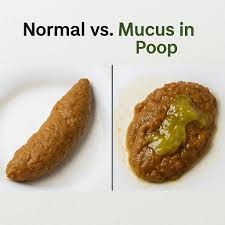At Media Health Group, we simplify complex medical issues and make it more comprehensible. Our major aim is t o equip our users with the proper knowledge so that in the case that you get signs from your body, you will comprehend them better and know what to do.

Have you ever seen jelly-like bits while you are passing out faeces or trying to wipe it? It is not a cause for worry to have a little mucus in your faeces because your gut creates it to lubricate. However, if it shows up frequently and has weird colors like yellow, white, green, or is accompanied with other signs, then it is time to get checked.
In the course of this article, we spell out 8 important facts about fecal mucus, when it is considered dangerous, when it is not, the causative factors, and what to do next.
- It can be seen as normal or even safe if there is a little or clear amount of mucus in your faeces and it is known to line up in the intestinal wall and aids in smooth ejection. It is formulated by goblet cells which are found in the colon and can be usually small or hidden.
- It is only visible if you have a harsh strain, experience constipation, or if it is fabricated a lot more than necessary but normally, little amounts that aren’t frequent aren’t a problem.
- A percentage of 50 people that have diarrhea based IBS show visible signs of white jelly like mucus in their faeces.
- It is often followed with gas, abdominal pains, unsteady bowels, and bloating. Mucus that is linked to IBS is perceived to happen due to the irritation of the colon lining by jerking faeces. It also causes more production of mucus.
- Ulcerative colitis and Crohn’s disease causes great harm to the wall of the intestines, which then leads to ulcers that secrete mucus and usually pus or blood.
- There might be a combination of Fecal Mucus with pus or blood and that can mean disease flare ups that are active. They cause symptoms such as loss of weight, constant diarrhea, urgency, cramps, and fever.
- Some acute infections which include C. difficile, Salmonella, Shigella, Campylobacter, or even parasites can usually bring about a lot of Fecal Mucus. The body has a build up of mucus to block and expel parasites.
- They are then followed by fever, diarrhea, throwing up, or cramping.
- Hemorrhoids can cause mucus to seep out if they cause any discomfort to the lining in the rectum but it is more of blood than mucus.
- Proctitis which is also known as an inflammation of the anus is caused by radiation, infections or inflammatory bowel diseases and it usually comes with blood, discomfort, and a lot of mucus production.
- Blockage in the bowels, colorectal cancer, and even polyps might lead to Fecal Mucus that has blood or is dark, but it usually doesn’t occur.
You should look out for the following warning signs:
- Sweating at night or fever
- Visible, constant, and huge volume of mucus everyday
- Serious cramps in the abdomen, nausea, or bloating
- Mucus that is bright red or has blood
- Tiredness or loss of weight
- Adjustments in toilet habits for more than a week
- Constant constipation or diarrhea for more than 3 days
If any of these occurs, you need to visit your doctor.
You should be expectant of a step by step examination:
- Past medical cases and when the symptoms appeared
- A physical examination that involves anal and abdominal examination
- Testing faeces for blood, inflammation, infection, and parasites
- Testing blood for CRP, CBC, and celiac examination
- More testing for sigmoidoscopy, biopsies, colonoscopy,or MRI imaging
With this, it is easy to find out if the mucus is caused by infection, structural issue, inflammation, or IBS.
Home care:
- If you think you have IBS, you should try a diet with low FODMAP but under watch.
- Have a diary for food, to see when mucus comes up, how it appears and what causes it.
- Don’t take stuff like spicy food, coffee, or milk if you are lactose intolerant.
- If you have diarrhea, drink lots of water.
Get professional help when:
- You feel the need to go to the toilet more often than usual
- Mucus is accompanied by blood or abdominal cramps
- You are experiencing dizziness, fatigue or feel parched
As at when a diagnosis of IBS is made, you can help to reduce the production of mucus by undergoing management for stress and taking medications like fiber supplements or antispasmodics.
No. It is very normal to have a small and clear amount of it. If you have random mucus without the followup of other symptoms, you are in the clear.
Yes, especially in IBS-D. It is usually transparent and like jelly, particularly when there is a flare up.
All the time. Seeing blood in your fecal mucus be it dark or bright red can imply that there is ulcer, inflammation, or cancer. You need to get help immediately.
Yes. Food issues like gluten, lactose, or fructose intolerance can affect the lining in the gut and increase the production of mucus.
No, not every time. Your doctor might do one if you are experiencing unexplained weight loss, blood, or chronic pain. If not, the only tests needed will be imaging or stool study.
Faecal mucus can be a small deal, nothing to worry about or just caused by irritation. However, at times, it might indicate bigger problems like IBD, IBS, food intolerance, or infections.
Little ideas breed proper knowledge. You can either treat or avoid mucus if you check it on time and care for it.